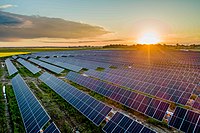
Photo from wikipedia
Abstract A solar-assisted biomass-based tri-generation system is suggested to provide domestic energy demands and studied from the perspectives of thermodynamics and sustainability. In the proposed combined system, gas and steam… Click to show full abstract
Abstract A solar-assisted biomass-based tri-generation system is suggested to provide domestic energy demands and studied from the perspectives of thermodynamics and sustainability. In the proposed combined system, gas and steam turbines are considered as the main power generation systems, while the chiller and an auxiliary heat exchanger exploit the thermal energy content of the effluent. A pressurized water circuit is also considered to harvest the waste heat from the employed steam cycle condenser and concentrated photovoltaic to feed the desired space heating. The main components of the integrated system are assessed exergetically to show the main exergy destructive units. The influence on the performance of the system of some decision parameters and summer/winter conditions as well is investigated. Results showed that the designed system is capable to feed 1241 kW space heating, 101.5 kW domestic hot water and 55.35 kW chilled water as space cooling, besides delivering 1MWe power. It is revealed that the pressure ratio of the air compressor leads to the system performance optimizing while the performance of the system has a linear relation with two variables of the gas turbine inlet temperature and cold end temperature difference within the air heater.
Journal Title: Sustainable Energy Technologies and Assessments
Year Published: 2021
Link to full text (if available)
Share on Social Media: Sign Up to like & get
recommendations!